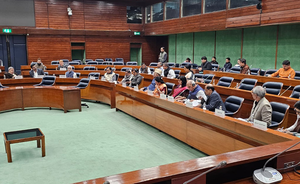New Delhi: The parliamentary committee scrutinising the Waqf bill is set to propose that the existing ‘Waqf by user’ properties will remain so if not in dispute or is a government facility, as the panel Monday adopted all amendments proposed by BJP members and negated those by opposition MPs.
Opposition MPs proposed amendments in all 44 clauses of the Waqf (Amendment) Bill, seeking to restore the provisions of the existing law, and claimed that the law proposed by the committee in its report would maintain the Bill’s “draconian” character and the bid to interfere in religious affairs of Muslims, sources said.
The meeting of the joint parliamentary committee headed by BJP MP Jagdambika Pal Monday was again marked by noisy protests by opposition members, who accused him of “subverting” democratic process.
The panel is set to adopt its report Wednesday with MPs of opposition parties such as the Congress, TMC, DMK and the AIMIM expected to give their dissent, the sources said.
With Parliament’s Budget Session set to begin January 31, the ruling BJP-led National Democratic Alliance can get the Bill passed in the first half of the session as it enjoys a majority in both the Lok Sabha and the Rajya Sabha, they added.
DMK MP A Raja alleged that the committee’s proceedings were reduced to a “mockery” and that the “report is already ready by this time.”
“The DMK, myself, will move the Supreme Court to strike down the new law after it receives Parliament’s nod,” he said.
Pal, however, rebutted the charges, and said the panel considered all the amendments in a democratic way. The view of the majority prevailed, he said, adding that the accepted amendments would make the proposed law better and more effective.
He noted that the government was bound to accept the changes made by the committee.
Among the other amendments supported by the BJP and its allies and adopted by the committee with 16 votes in favour and 10 against is the decision to do away with vesting any inquiry into disputes over a government property with the district collector concerned, the sources said.
The accepted amendment proposed by BJP MP Brij Lal said that the “state government may by notification designate an officer above the rank of collector” to carry out an inquiry, as per law.
Several Muslim bodies had objected to the authority given to the collector, noting that he was also the head of revenue records, and any inquiry by him might not be impartial as he would go by his own office’s claim.
While the Bill removes the concept of “Waqf by user”, where properties could be deemed as Waqf-based solely on their long use for religious purposes, one amendment moved by BJP MP Nishikant Dubey and accepted by the panel made some allowances for such existing facilities.
“Waqf by user” will remain as Waqf properties, except when these are in dispute or are government facilities, it said.
However, the amendment also makes it clear that such existing properties must be registered before the new law comes into force, the sources said.
While the Bill states that only a person practising Islam for at least five years may declare a Waqf, which refers to properties dedicated exclusively for religious or charitable purposes under Islamic law, an amendment passed by the panel adds that such a person should be showing or demonstrating that he or she is practising the religion for five years, according to the sources.
With the Bill making it mandatory for every Waqf registered under the existing law to declare the property’s details on its website within a period of six months from the proposed Act coming into force, another cleared amendment will now give the “Mutawalli (caretaker)” the authority to extend the period, subject to satisfying the Waqf tribunal in the state.
An amendment proposed by BJP MP Sanjay Jaiswal and accepted by the committee seeks inclusion of one person having knowledge of Muslim law and jurisprudence as a member of such tribunals, the sources said.
Hitting out at Pal, TMC MP Kalyan Banerjee claimed, “Everything was pre-decided. We were not allowed to say anything. No rules and procedures were followed. We wanted to discuss the amendments clause by clause but were not allowed. The chairperson moved the amendments and then declared them without listening to our points. This is a bad day for democracy.”
In total, hundreds of amendments were proposed by the committee members. The amendments were consolidated and linked to the clauses they referred to before the panel took them up.
PTI






































